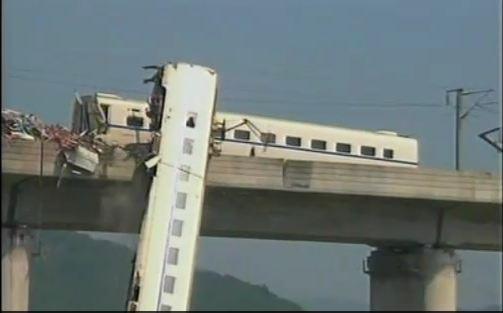Chinese Online Anger Over Train Tragedy
Train accident in China killed more than 30 people and injured several more.
The collision of two high-speed trains last Saturday night near the eastern Chinese city of Wenzhou not only killed 39 people and left a couple hundred more injured, it also unleashed an almost unprecedented online response of public outrage, which has spilled over even into the official media. Part of the reason is the turbo-charging effect of China’s version of Twitter, called “weibo.” It’s just two years old, and already, 140 million Chinese are using it.
Weibo provided the first public word of the train wreck when someone onboard tweeted within a couple of minutes after the crash. Over the past week, it has become the place to vent anger, share information and often scoop the state-controlled media. There have been tearful accusations by relatives of those killed, one of whom appears in a video on the website of the Southern Metropolitan Daily.
In the video, Wang Hui said she wants to know the truth about why her husband died. “Give me the truth!” Wang said. “Don’t try to fool me! I’m not afraid to leave this world with him.”
But instead of giving straight information, railway officials first tried to change the official time of the crash, moving it forward several minutes, so it wouldn’t be as hard to explain why the second train hadn’t been alerted that the first train was stalled ahead of it.
This comes on the heels of other recent scandals and disasters that have frayed public trust, said Shi Anbin, a Tsinghua University media studies professor. “So this Wenzhou incident really served as a kind of fuel. It intensified public anger accumulated since the beginning of this year.”
He added that Weibo has poured still more fuel on the fire, in part because much of China’s online community, the educated middle class, intersects almost perfectly with those who take the new high-speed trains. This is the sector of society that has been increasingly more vocal in demanding the government do better. One such person, Liu Dongdong, put his frustrations to music.
The song “Nothing to My Name” by China’s most famous rocker, Cui Jian, started out as an anthem for pro-democracy demonstrators in Tiananmen Square in 1989. Now it’s been set to different lyrics: “Passengers need your hand, not your excuses. But you just dodge and talk nonsense. Oh, you seem to be doing a PR show. Oh — are you feeling guilty?”
All of this and more has been flying around Weibo, despite a Propaganda Department directive that Chinese journalists should not do their own
independent reporting or analysis on the train crash. The state-run media have largely ignored the directive. Still, media analyst Michael Anti thinks what’s going on is less an online revolution forcing more transparency than the government allowing people to vent — within limits.
“The clever journalists already know that the railway ministry has become a convenient target. It’s not about success of freedom of the press. It’s because the Railway Ministry is so corrupt even the top leaders think it’s time to end the situation.”
And in that way, Weibo outrage can be a useful tool. Still, Anti suspects this week’s freewheeling criticism on Weibo might lead to more government controls over it in the future. Already, censors have deleted some posts and photos. Anbin said another effect is possible: “I think it will also facilitate the transformation of the official media to public service media, because now they have pressure from citizen journalism. And the mainstream journalism has to be changed in accordance with the public interest, not always with the official interest.”
At least that seemed true this week. Chinese Central TV anchor Qiu Qiming said on air that perhaps China’s development is moving too fast, without enough regard for human safety and respect for human life.
“Can we drink a glass of safe milk?” Qiming said. “Can we live in apartments that do not fall down? Can the roads we drive on in our cities not collapse? Can we afford the people a basic sense of security? China, please slow down. If you keep going so fast, you may leave the souls of your people behind.”
